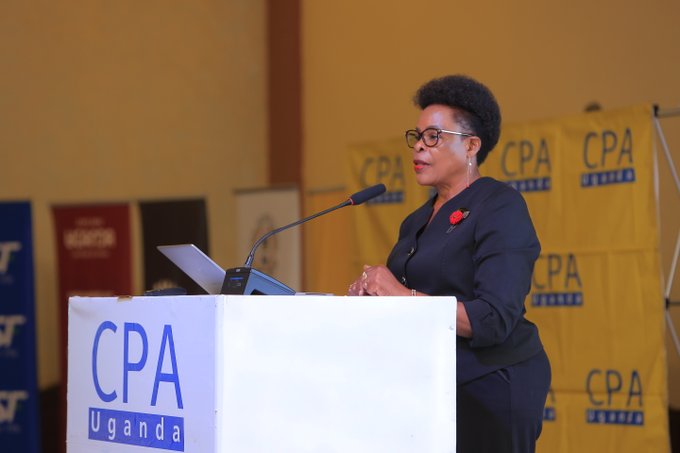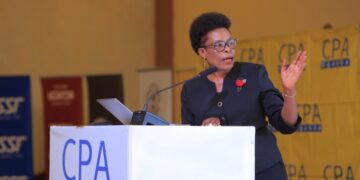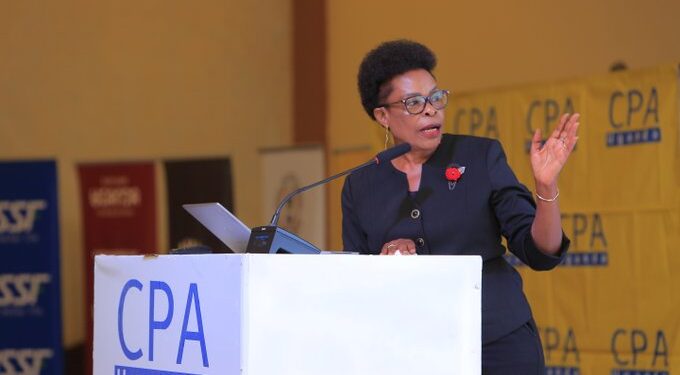Only 30,000 people, categorised as government officials, have made Uganda one of the most corrupt countries in the world and one of the least developed, the Inspector General of Government (IGG), Hon. Beti Olive Namisango Kamya-Turwomwe, has said.
Kamya was on Wednesday making a presentation on the “Impact of Corruption & Fraud on the Economy” at the 12th CPA Economic Forum held at Imperial Resort Beach Hotel in Entebbe.
According to her, several decades ago (the 1960s – early 80s), a teacher would ask, “What’s the problem of Uganda (Africa)?” and an average student would reply, “Ignorance, disease and poverty”.
In the late 80s / 90s, a teacher would ask, “What’s the problem of Africa?” and the student would reply, “Leaders who don’t give up power”.
In the 21st century, a teacher asks, “What’s the problem of Africa?” and the automatic answer is “Corruption”.
Kamya defined corruption as dishonest or illegal behaviour or the misuse (abuse) of entrusted power or authority for private gain. “It means, not just financial gains but also non-financial advantages e.g. sexual harassment and abuse, nepotism, absconding from duty, late-coming without authorization, poor service delivery to the public.”
She defined fraud (a subset of corruption) as criminal deception intended to result in unlawful or unethical financial or personal gain, a knowing misrepresentation of the truth or concealment of a material fact to induce another to act to his/her detriment.
In her presentation, Kamya said of the 45.9 million Ugandans (as per Uganda Bureau of Statistics (UBOS) 2024 Census data), only 30,000 can decide how public resources are used and have access to the decision-making arena (dining table).
According to the IGG, the latest count of public officers in Uganda put them at 380,000, out of which: 150,000 are teachers, 80,000 (soldiers), 40,000 (Police force), 15,000 (Prisons’ services) and 65,000 (lower employees including secretaries, and cashiers, cleaners, drivers, office attendants, tea girls, receptionists, gatekeepers, storekeepers, junior accountants, and surveyors, etc).
The remaining 30,000 are top officials including; the President, Ministers, Members of Parliament, Judges, Permanent Secretaries, Undersecretaries, Commissioners, executives of public institutions, Resident District Commissioners, Presidential Advisors, Magistrates, and State Attorneys etc.
Kamya stated categorically that it is these 30,000 officials that have made Uganda a “country where hundreds of thousands of Ugandans are fleeing their Motherland not for political reasons but for economic reasons, the reason for poor service delivery etc…… and we allow it?”
“This year, Transparency International’s Corruption Perception Index rated Uganda at 26% and among the 39 most corrupt countries in the world, of the 181 countries that were rated. The IG’s own study commissioned in 2021 reported that Uganda is estimated to lose nearly UGX 10T every year.”
To put this in context, Kamya said Uganda’s domestic revenue for FY 22/23 was UGX 25.55T but Shs10 trillion was siphoned by these 30,000.
“So, the UGX 10T which we lost to corruption in that FY is equivalent to 40% of all the money we collected in taxes, then we borrowed UGX 27.2T to raise our national budget to UGX 52.7T….when all we needed to borrow was UGX 17T instead of UGX 27T and if we go by this trend and do nothing about it, it will get worse,” she noted.
How the Shs10 trillion was stolen
Kamya cited some avenues that the survey of 2021 on the cost of corruption which came up with the figure of UGX 10T lost to corruption per year revealed as some of the key sources of illicit outflow of public funds.

She cited taxation (non-declaration, under-declaration, falsification of information) and procurement (over-pricing of goods, purchase of poor quality goods at premium prices, under-delivery, air-purchase, poor quality work, unfinished contracts, awarding contracts to non-deserving suppliers leaving out competent suppliers, kick-backs etc) – many of you in this room oversee procurement functions in your institutions.
She further cited inflated payroll, ghost workers, ghost claimants, ghost beneficiaries and recruitment of unqualified staff based on fake academic or professional documents – non-qualified engineers, accountants, procurement officers, human resource officers, drivers, health workers, teachers etc.
“District Service Commissions are appointed based on political patronage, they in turn recruit undeserving people on political patronage. Most of these unqualified employees of the government pay to get their jobs, pay to keep their jobs and where do they get the money to pay? From big bro Corruption – but much this happens under your watch,” explained Kamya.
She added: “Then there is raw corruption where “Loose Minutes are raised” for non-existent activity and lots of money is syphoned out to execute non-existent activities, money loaded onto accounts of lower level staff who withdraw it and give it to the boss etc.”
Impact of corruption on the economy
According to her, corruption diverts resources from a public good into the pockets of a few people.
She blamed the vice for poor quality services, distortion of planned development / haphazard development, expensive economy, lack of basic social services and the high cost of the economy makes Uganda unattractive to investors hence low job creation, low tax collection as well as siphoning of resources outside Uganda in order to hide illicit wealth thus denying Uganda capital for development and job creation.
Role of Public Accountants
She called upon public accountants to join the war against corruption as an institution by encouraging their colleagues to become whistleblowers and report on corrupt activity, and lifestyles of colleagues and workmates which are not commensurate with their known sources of income.
“You can earn 5% of the funds recovered,” she appealed.
According to Kamya, at the heart of all these fraudulent activities in government is an accountant or an auditor using the profession not to help save public money as trained but to help steal money.
“Each Ministry, Department or Agency of Government has an accountant, usually at a senior level, usually very highly qualified, and usually there is an internal auditor, hired and paid to ensure public funds are used well for the development of this nation, but unfortunately, the accountant, the auditor, is used to siphon the money out “legally”, covering up the fraud, theft, embezzlement, abuse of office, using their professional knowledge,” she noted.
She asked the Institute of Public Accountants of Uganda (ICPAU) to put its house in order first saying that would be “more useful for the economy than making suggestions for policy formulation, which policy will end up in funds being swindled and embezzled with the very professional help of accountants who proposed the new policies”.









